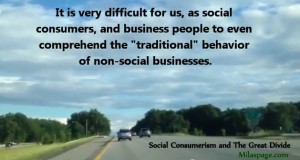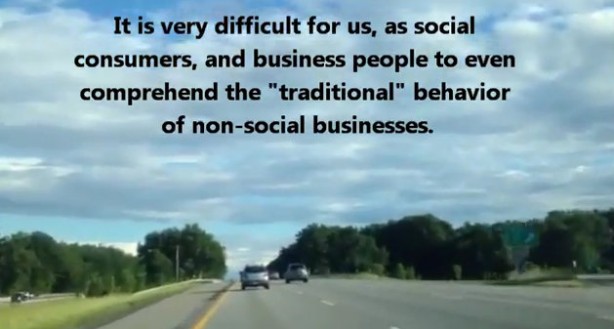As more and more brands are learning how to do social business and integrating social mindsets into all areas – the divide between the traditional business (non-social), and the social business is evident. For the social consumer the differences can be intolerable.
Will the rise of the social consumer change you?
In the video short below “Drive Blog: Episode 1” , I discuss the difference I see in businesses that demonstrate social values, and share the story of what happened when Chris Brogan tried to get some resolution to an issue on a Facebook Page. What would your response have been if Chris Brogan wrote to you on your brand’s Facebook page, and is this how you would treat every customer?
In exploring the attributes of the Social vs. Non-Social Mindset I found several key differences:
The Social Business:
- Is Agile, Adaptable, Friendly and responsive.
- Integrates Social Media success strategies into all departments, creating a culture of Social Behavior which benefits the company itself (increasing internal communications) as well as the consumer.
- Sam Fiorella, Chief Customer Experience Strategist for Sensei Marketing, has some excellent examples of this from his presentation at #140MTL, where he introduced the concept of his upcoming book: “Business 20/20″
- Understands that there is no such thing as “Meeting Expectations”.
- Stan Phelps, Author of “What’s Your Purple Goldfish” gives excellent examples of how businesses are using social to go the extra mile, and shares the ideas of what the mindset on customer service has evolved into.
- Understands that every individual counts, and considers the power of Influence.
- As discussed by Mark Schaefer, who shared his research from his new book : The Return On Influence, at #BWENY this week.
- Works on a person to person basis, realizing that in speaking with one, they are actually speaking with many.
- Realizes that although interactions may start online, many conversations require further discussion and will take the issues off line for deeper engagement or resolution using traditional methods, like a phone call or meeting.
Social Business = Increased Accountability
As consumers become used to this social behavior from businesses, it becomes increasingly difficult to understand the behavior of traditional businesses who are less responsive, are burdened by layers of red tape, and who think it’s acceptable to put the complaint of one on a back burner while they get themselves organized internally.
The public nature of doing business socially increases brand accountability, and requires members within the organization to be empowered to respond and resolve issues fairly and quickly in the public eye. The emerging social consumer has no tolerance for non-social processes that are time consuming, and often go nowhere.
“I don’t trust a business if they are not on Twitter”
I quote JD Andrews ( @earthxplorer ) in my video above. A few months ago, he was visiting Montreal, we had a wonderful chat about customer service and social business. He made the striking comment: ” I don’t trust a business if they are not on Twitter”. Although the statement may seem extreme, as social business evolves what we are starting to see is that the customer centric companies and those who wish to be transparent are making their way into the social space and “being” social. As we as consumers become used to dealing with organizations on these levels which allow deeper interactions, I believe that the social consumer will reflect JD’s view on this, if the business isn’t social, perhaps it’s simply not worth dealing with at all. As consumers, we certainly don’t have the time for all the red tape, nor for the frustration of not being heard when there are business out there who are listening to us.
It has nothing to do with whether you have a Facebook or Twitter account, it has to do with what you do with it, and how much you really understand the objective of being in these spaces. It’s not about form letter’s , it’s about being able to truly show you care, have true dialogue and being personal.
Share your thoughts:
 Have you transitioned to social behavior?
Have you transitioned to social behavior?
How have your expectations changed since the emergence of social?
How long will you tolerate doing business with a company that doesn’t get social?
Related articles





Leave a Reply